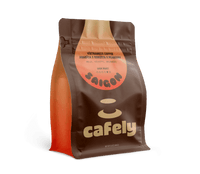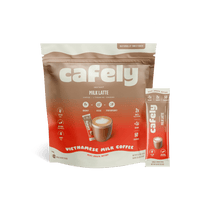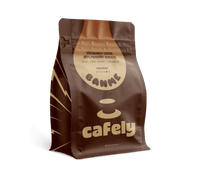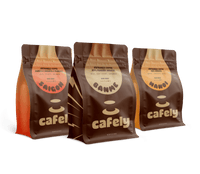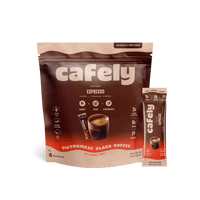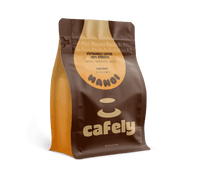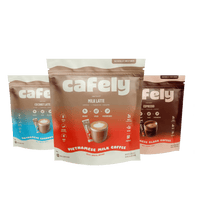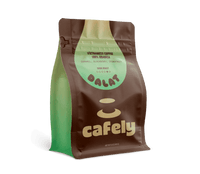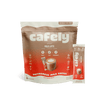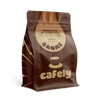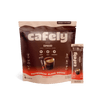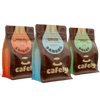Feeling that mid-afternoon crash? You’re not alone — and there’s a better way to power through.
About 73% of adults in the U.S. drink coffee every day, and for good reason. It’s not just a habit — it’s about staying sharp when energy dips. Especially around 2 PM, when our brains slow down and it’s harder to focus.
You don’t need sugar or energy drinks to stay alert. Natural strategies — paired with a great cup of coffee — can help you push through that afternoon slump without crashing later.
Let’s explore healthy ways to outsmart fatigue.
5 Natural Strategies to Combat Afternoon Fatigue
You don’t need to reach for a soda or a sugary snack when that sleepy feeling rolls in. These five simple, natural habits can help you feel more awake — and they’re easy to add to your day.
1. Drink More Water (Seriously)

It sounds too simple, but dehydration is one of the most common causes of tiredness — and many people don’t even realize they’re low on fluids.
Even mild dehydration can cause fatigue, brain fog, and mood swings. When your body doesn’t have enough water, it works harder to pump blood and deliver oxygen to your brain. That’s part of why you feel sluggish.
What to do:
- Keep a water bottle nearby and sip throughout the day
- Add lemon or mint for a little flavor boost
- Drink a glass of water before reaching for coffee — it helps caffeine absorb better, too
Pairing hydration with your regular coffee habit can make both work better. If you enjoy a bold cup of Vietnamese peaberry or other strong coffee, pair it with a glass of cold water to help balance things out.
2. Move Your Body (Just a Little!)
No need to hit the gym — a quick walk around the block or even a few light stretches at your desk can work wonders.
Movement gets your blood flowing, increases oxygen to your brain, and boosts feel-good chemicals like dopamine and serotonin. These changes help you feel more awake, more focused, and less cranky.
Try this:
- Walk up a flight of stairs
- Do 10 jumping jacks
- Stretch your arms overhead and take three deep breaths
- Even standing for a few minutes can help
Bonus tip: Take your afternoon coffee outside for a quick walking break. You’ll get movement and caffeine — two of the best tools against the 2 PM slump.
3. Let in the Light
If you’re sitting under fluorescent lights all afternoon, your brain might not know what time it is.
Natural light helps regulate your circadian rhythm — the internal clock that controls your sleep-wake cycle. Without it, you may feel groggy, sluggish, or even moody.
How to reset your rhythm:
- Open the blinds or sit near a window
- Step outside for 10 minutes around lunch
- Swap your desk lamp for a full-spectrum bulb if you’re stuck indoors
Even just a few minutes of daylight can help your brain shake off that afternoon fog.
4. Snack Smarter, Not Sweeter
A sugar rush might feel good for 20 minutes — but the crash that follows makes everything worse.
Instead, go for snacks that combine protein, fiber, and healthy fats. These slow-burning nutrients help keep blood sugar steady, which means your energy stays even, too.
Great afternoon snack options include:
- Apple slices with almond butter
- A handful of trail mix (no candy!)
- Carrot sticks and hummus
- Greek yogurt with chia seeds
- Rice cakes with avocado or cottage cheese
These snacks keep you full longer — and won’t mess with your focus.
5. Breathe Like You Mean It
Sometimes, all it takes to feel more alert is a deep breath — done the right way.
Mindful breathing helps send more oxygen to your brain and triggers your body’s natural “wake-up” signals. It can also lower stress, which often builds up by mid-afternoon and adds to that crash feeling.
Try this technique: Stimulating Breath (Bellows Breath)
- Sit tall with your mouth closed
- Inhale and exhale quickly through your nose, keeping breaths short and even
- Do three rounds of 15–30 seconds, then return to normal breathing
Or try box breathing:
- Inhale for 4 seconds
- Hold for 4 seconds
- Exhale for 4 seconds
- Hold for 4 seconds
- Repeat 4–6 rounds
This is a great habit to build into your coffee break. Brew a cup, step outside, and take a moment to breathe deeply while you enjoy it.
Need Something Stronger? Low-Caffeine Alternatives for a Gentle Boost
Sometimes, water and sunlight just don't cut it. You want a little boost — but without the sugar crash or the wired feeling that comes from a second cup of strong coffee.
Luckily, there are plenty of natural options that offer light, sustained energy. From calming teas to smart coffee-adaptogen combos, here’s how to feel more awake without overdoing the caffeine.
1. Green Tea: Light, Soothing, & Antioxidant-Packed

Green tea is one of the most popular low-caffeine alternatives for a reason. It offers about 25–35 mg of caffeine per cup, which is far less than coffee — but still enough to perk you up.
Plus, it’s rich in L-theanine, an amino acid that helps promote calm alertness. Together, caffeine and L-theanine can give you focus without the crash — perfect for powering through emails or meetings.
You also get a hit of antioxidants like EGCG, which support overall health and metabolism.
2. Matcha: Calm Focus That Lasts Longer

Matcha is a type of powdered green tea — but it’s far more potent. It has about three times the antioxidants of regular green tea and around 60–70 mg of caffeine, depending on how it’s made.
What makes matcha special is its slow-release energy. Unlike coffee, which hits fast and fades, matcha gives you a steady lift over several hours thanks to the L-theanine that helps buffer the caffeine spike.
It’s also versatile: enjoy it hot, iced, in smoothies, or even with plant-based milk.
For more about its benefits, see this detailed breakdown on caffeine in matcha.
3. Yerba Mate: The Brainy Boost Without the Jitters

Yerba mate is a South American herbal drink that’s made by steeping dried leaves — much like tea, but with a flavor that’s earthier and more robust.
It contains about 80 mg of caffeine per cup, putting it close to coffee in strength — but many people report fewer jitters and a cleaner focus.
That’s because yerba mate also contains theobromine (also found in dark chocolate), which promotes mental clarity and mood without overstimulation.
If you're someone who switches between tea and coffee depending on your day, this guide on coffee vs. tea breaks down the differences clearly.
4. Golden Milk: A Caffeine-Free Comfort Boost

Need an energy lift without any caffeine at all? Golden milk (aka turmeric latte) is a warm, spicy blend made with turmeric, cinnamon, ginger, and milk or a milk alternative.
It’s naturally caffeine-free but still feels comforting and energizing — likely because of the anti-inflammatory benefits of turmeric and the warming nature of the spices.
Turmeric contains curcumin, which has been linked to better brain function and reduced fatigue. Add a pinch of black pepper to boost absorption, and enjoy it as a calming afternoon ritual.
5. Coffee + Adaptogen Stacks: Gentle Energy, Smarter Focus

If you love your coffee like most people do, there’s a way to keep it in your routine while still softening the crash: adaptogens.
Adaptogens are natural herbs and mushrooms that help your body handle stress, regulate energy, and promote balance. When combined with caffeine, they can take the edge off while enhancing the benefits.
Looking for a coffee that pairs naturally with these earthy herbs? Whether it’s mushroom coffee or blends of other supplements, there’s something for everyone.
VC2 (Vietnamese Coffee 2.0) is engineered to provide that extra push — a bold Vietnamese robusta blend enhanced with L-theanine, cordyceps, Rhodiola, ginseng, and Lion's Mane for clean energy, cognitive clarity, and crash-free focus.
→ Try VC2 Risk-Free for 90 Days
Now let's get into the five most powerful crash-free energy stacks to try:
Ashwagandha + Coffee
Ashwagandha is best known for helping the body manage stress by lowering cortisol levels — your body’s primary stress hormone [1]. When combined with coffee, it smooths out the edges, reducing the chances of feeling overstimulated or anxious. You still get that boost of energy, but with a grounded, calm focus that keeps you sharp without feeling wired.
Rhodiola Rosea + Coffee
This adaptogen is popular among high-performers and early risers for a reason — it supports stamina, resilience, and mental clarity, especially during stressful stretches [2]. Paired with coffee, Rhodiola helps extend your brain’s “battery life,” so you stay focused longer without the rollercoaster dip later in the day.
Cordyceps Mushroom + Coffee
Cordyceps has earned a reputation as the go-to for physical energy. It supports ATP production — basically your body’s cellular fuel — and helps improve oxygen use [3]. Add it to your coffee, and you get a steady push of clean energy that’s perfect before a workout or powering through your busiest work hours.
Take a look for more information on mixing mushrooms and coffee.
Lion’s Mane + Coffee
Need brainpower? Lion’s Mane may support memory, mental clarity, and even your brain’s ability to grow and adapt [4]. Combined with coffee, it’s a nootropic dream — short-term alertness from caffeine plus long-term support for focus and cognition. This duo is especially great if your afternoon crash hits during deep-thinking or creative work.
Maca Root + Coffee
If your energy dip is more about mood or motivation, maca might help. It’s a root traditionally used to support hormone balance and boost stamina [5]. Mix it with coffee for a gentle lift that improves both mood and physical energy — without the jittery spike and crash of high-caffeine drinks.
Looking for a coffee that pairs naturally with these earthy herbs? The bold, rich flavor of Vietnamese coffee makes it an excellent base for adaptogen stacks, especially blends like maca or ashwagandha that benefit from a strong, smooth roast.
Related: What Does Mushroom Coffee Taste Like?
Understanding the 2 PM Slump
You're cruising through your day — and suddenly, like clockwork, you hit a wall. Focus fades, motivation dips and all you want is a nap or a snack. Sound familiar?
That afternoon crash, often between 1 PM and 4 PM, isn’t just in your head — it’s built into how your body works.
Let’s look at why it happens — and how to handle it better.
1. Circadian Rhythms: Your Internal Clock at Work
Your body follows a natural 24-hour cycle called the circadian rhythm. It affects everything from your sleep patterns to hormone levels — and, yes, your energy throughout the day.
Most people experience a natural dip in alertness in the early afternoon. This dip is completely normal, especially if your morning is packed with tasks and screen time.
That sluggish feeling? It’s your brain asking for a brief reset — not a sign you need a sugar bomb or another energy drink.
2. Poor Sleep = Poor Energy
If you’re not sleeping well at night, you’ll feel it the next day — especially in the afternoon.
Even just one night of poor sleep can increase cortisol (stress hormone), reduce your attention span, and make you crave quick fixes like sugar or caffeine.
Over time, poor sleep adds up. The more sleep debt you carry, the harder it is to stay focused past lunch.
Tip: Try cutting caffeine by mid-afternoon and stick to a wind-down routine at night to support deeper sleep.
3. That Heavy Lunch Crash
Eating a large or carb-heavy lunch can make the 2 PM slump worse. Why? Because your body needs energy to digest — and when it’s focused on breaking down a heavy meal, there’s less blood and oxygen flowing to your brain.
The result: drowsiness, low motivation, and that glazed-over feeling.
Instead, try lighter lunches with lean protein, veggies, and healthy fats — and save the heavier meals for dinner.
4. It’s Time for a Drink (of Water!)
Even mild dehydration can lead to fatigue, headaches, and brain fog. And most of us don’t drink enough water, especially in the first half of the day.
By the time afternoon hits, your body may already be running low on fluids.
Pair your coffee with a glass of water, or set a reminder to sip every hour. A well-hydrated body moves oxygen more efficiently — and that means sharper thinking, better mood, and fewer crashes.
5. Sitting Too Long
If you’ve been sitting at your desk all day, your body might be stuck in “low-power mode.”
Movement triggers blood flow, boosts circulation, and even increases dopamine and serotonin — two brain chemicals that affect motivation and mood.
Even just 5–10 minutes of movement — like walking, stretching, or climbing stairs — can restart your system and get your energy back on track.
Why Avoid Sugar & Energy Drinks in the Afternoon?

When you're dragging, it’s tempting to reach for something fast — like a candy bar or an energy drink. But that quick fix comes at a cost.
1. Sugar Spikes Lead to Energy Dips
Sugar causes a quick rise in blood glucose — which can feel like an energy boost at first. But as insulin kicks in to process the sugar, your levels drop quickly, leaving you even more tired than before.
That crash often hits 30–60 minutes later and can trigger cravings for even more sugar — starting a frustrating loop that's hard to break.
2. Energy Drinks = Overstimulation & a Crash
Energy drinks like Monster are usually packed with high doses of caffeine, sugar, and synthetic additives. Sure, they’ll wake you up — but only temporarily.
Once the caffeine from the energy drink wears off, you’re often left feeling more drained than when you started. Plus, these drinks can cause jitteriness, increased heart rate, and sleep problems later on.
3. Caffeine Sensitivity Varies by Person
Caffeine has a half-life of around 5–6 hours, meaning half of it can still be in your system at bedtime if you drink it after 2 PM.
If you’re sensitive to caffeine, even your usual coffee might interfere with sleep — making the next day’s energy crash even worse.
Instead, try lighter caffeine options like green tea. Or if you enjoy drinking strong Vietnamese brews, try switching to less-caffeinated arabica or blends with adaptogens for a smoother, longer-lasting effect.
When to Talk to a Doctor
If your afternoon fatigue is constant, severe, or interfering with daily life, it’s worth checking in with a healthcare professional.
Chronic fatigue can be linked to certain health conditions, such as [6]:
- Anemia
- Thyroid imbalances
- Sleep apnea
- Depression
- Nutrient deficiencies
If your energy crashes come with symptoms like unexplained weight loss, mood changes, or disrupted sleep, don’t just power through — get it checked out.
Final Thoughts: Small Shifts, Big Difference
That 2 PM crash doesn’t have to own your afternoon. By understanding what causes it — and making small, smart changes — you can stay energized, clear-headed, and productive.
Hydrate more. Move a little. Rethink your lunch. And if you need a boost? Skip the sugary quick fixes and build a smarter habit — whether it’s a lighter brew, an adaptogen stack, or a calm-focus tea.
Your body (and your brain) will thank you later.
Frequently Asked Questions (FAQs): Beat the Slump
1. Why Do I Feel Tired Every Afternoon?
That mid-day slump is often caused by your circadian rhythm, but things like poor sleep, low hydration, or heavy meals can make it worse.
2. Is it Okay to Take a Short Nap in the Afternoon?
Yes! A 20-minute nap can help restore energy and focus — just avoid napping too long or too late in the day. Sleeping for more than 20 minutes can make you feel more tired.
3. How Does Hydration Affect Energy Levels?
When you're dehydrated, your brain gets less oxygen and blood flow, which can make you feel foggy, tired, or sluggish.
4. Can Certain Foods Help Prevent the Afternoon Slump?
Yes — snacks with protein, fiber, and healthy fats give you steady energy. Try things like trail mix, yogurt, or nut butter with fruit.
5. Are There Any Supplements That Can Help?
Some people benefit from B vitamins or adaptogens like ashwagandha, but it’s best to check with a doctor before starting anything new.
6. How Does Physical Activity Influence Afternoon Energy?
Just a short walk or stretch can get your blood flowing and boost brain chemicals that help you feel more alert and focused.
7. Is Caffeine Always Bad in the Afternoon?
Not necessarily. A small dose of caffeine early in the afternoon may help, but everyone reacts differently — especially when it comes to sleep.
8. Can Stress Contribute to Afternoon Fatigue?
Yes — chronic stress can drain your energy and make it harder for your body to bounce back during the day.
9. How Does Sleep Quality Affect Daytime Energy?
Poor sleep affects focus, mood, and memory. Even one restless night can lead to a stronger 2 PM crash the next day.
10. When Should I Seek Medical Advice for Fatigue?
See a doctor if your fatigue is persistent, getting worse, or comes with symptoms like weight loss, depression, mood swings, or sleep problems.
References
- National Institutes of Health. (2023, October 24). Office of Dietary Supplements - Ashwagandha: Is It Helpful for stress, anxiety, or sleep? Ods.od.nih.gov.
- Tinsley, G. M., Jagim, A. R., Potter, G. D., Garner, D., & Galpin, A. J. (2023). Rhodiola Rosea as an Adaptogen to Enhance Exercise Performance: A Review of the Literature. British Journal of Nutrition, 1–27.
- Phull, A.-R., Ahmed, M., Park, H.-J., & Cordyceps Militaris As A Bio. (2022). Citation.
- Docherty, S., Doughty, F. L., & Smith, E. F. (2023). The Acute and Chronic Effects of Lion’s Mane Mushroom Supplementation on Cognitive Function, Stress and Mood in Young Adults: A Double-Blind, Parallel Groups, Pilot Study. Nutrients, 15(22), 4842–4842.
- Meissner, H. O., P Mrozikiewicz, T Bobkiewicz-Kozlowska, A Mscisz, B Kedzia, A Lowicka, H Reich-Bilinska, Kapczynski, W., & I Barchia. (2006). Hormone-Balancing Effect of Pre-Gelatinized Organic Maca (Lepidium peruvianum Chacon): (I) Biochemical and Pharmacodynamic Study on Maca using Clinical Laboratory Model on Ovariectomized Rats. International Journal of Biomedical Science : IJBS, 2(3), 260.
- Sapra, A., & Bhandari, P. (2023, June 21). Chronic Fatigue Syndrome. PubMed; StatPearls Publishing.
